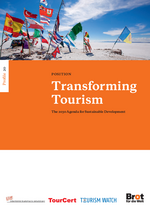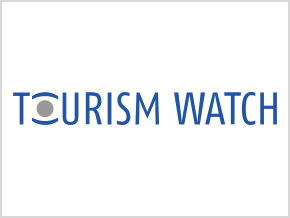Agenda 2030 and Tourism
Sustainable tourism is mentioned a total of four times in the 2030 Agenda for Sustainable Development. The explicit mention of the sector not only emphasises its global importance, but at the same time commits it to fundamentally changing the tourism model that is so widespread today. All too often, human rights are violated, workers exploited and nature destroyed in the name of tourism development. In short, it operates in sharp contrast to sustainable development.
Transforming our world
In September 2015, all member states of the United Nations jointly adopted the 2030 Agenda with its 17 Sustainable Development Goals (SDGs) under the visionary title "Transforming of our World". The strength of the Agenda lies in its holistic approach, its complexity and its strong vision of a fundamental transformation of our world.
The 2030 Agenda is addressed to all countries - both Southern and Northern. While the countries of the Global South should receive special support, the Agenda calls on industrialised nations to reduce their disproportionate consumption of resources and to reform their economic and development policies in such a way that they do not harm other countries. Tourism is also included in this context.
The transformation of tourism is urgently needed
Although tourism is one of the fastest growing economic sectors, only a small part of the world's population continues to travel, while the majority is directly or indirectly affected by its impact. This raises questions of justice. In the absence of regulation at international, national and local levels, tourism is growing unabated and exacerbating existing injustices – workers are being exploited, local communities displaced, cultures commercialised, finite natural resources consumed and the opportunities of future generations threatened.
Transforming our world is not possible without transforming tourism.
Transforming Tourism Initiative
The 2030 Agenda as a frame of reference
For tourism to contribute to sustainable development, a fundamental change in tourism is needed. Business as usual is not an option. Human rights and community self-determination must be at the heart of any tourism development. The benefits derived from tourism must be distributed fairly. Only if tourism improves local living conditions it can support sustainable development.
The 2030 Agenda calls for sustainable tourism on several occasions and is committed to the necessary change. Thus, it offers an important frame of reference for bringing the demands for a fundamental change in tourism back into the public discourse.
Nevertheless, the Agenda has weaknesses. Some objectives and indicators for measuring the achievement of objectives are not defined clearly enough. In particular, the tourism-related indicators, without any thought, are based on an unregulated growth of the sector with considerable side effects. Instead of promoting the development of tourism per se, the influencing factors that contribute to the transformation of the sector must be identified.
As a complex sector, tourism has a considerable impact on the living conditions of the local population and labour force, as well as on their environment and culture. Tourism can thus contribute significantly to the achievement of any SDG. In an online compendium, experts from civil society and academia have analysed the link between tourism and each individual SDG.
In the following objectives, tourism is explicitly mentioned in the 2030 Agenda:
Goal 8: Promote sustained, inclusive and sustainable economic growth, full and productive employment and decent work for all.
Target 8.9: By 2030, devise and implement policies to promote sustainable tourism that creates jobs and promotes local culture and products.
Goal 12: Ensure sustainable consumption and production patterns.
Target 12.b: Develop and implement tools to monitor sustainable development impacts for sustainable tourism that creates jobs and promotes local culture and products.
Goal 14: Conserve and sustainably use the oceans, seas and marine resources for sustainable development.
Target 14.7: By 2030, increase the economic benefits to Small Island developing States and least developed countries from the sustainable use of marine resources, including through sustainable management of fisheries, aquaculture and tourism.
Tourism Watch demands:
Transforming policies
All states are called upon to implement the 2030 Agenda– in tourism too. They must impose binding rules on the sector, which has so far been largely unregulated, and enforce them. UNWTO, the United Nations Special Agency for Tourism, is also called upon to support overarching initiatives in this area and to promote dialogue among all stakeholders. Effective mechanisms for the co-determination of civil society and local communities in tourism development must be created and a human rights-based approach to tourism strengthened. There is an urgent need for global strategies to reduce the consumption of resources such as land or water and emissions, especially from air and sea transport.
Transforming businesses
Companies are also required to align their management processes with all 17 goals for sustainable development and with the UN Guiding Principles for Business and Human Rights. They must exercise their human rights due diligence throughout the entire tourism value chain - from travel to local activities - and report transparently. If they buy products on site and hire local employees on fair terms, they can better integrate local markets and boost value creation.
Transforming consumption
Last but not least, travellers are also asked to take responsibility for themselves by respecting their hosts and their culture, being mindful of scarce local resources, supporting the local economy and respecting the dignity of their hosts.
For more than 40 years, civil society organisations have been working to make the voices of people marginalised by tourism heard – including in the 2030 Agenda process. In an online compendium, experts from civil society and academia analysed in detail the links between tourism and the individual SDGs.
The authors and other representatives of academic and civil society organisations critical of tourism met in Berlin in March 2017 to discuss the 2030 Agenda. More than 30 participants from 19 countries contributed their experience, expertise and concerns. Together they developed the Berlin Declaration on "Transforming Tourism". With this they want to initiate further debates and reflections and demand the implementation of specific, urgently needed measures.


![[Translate to english:] Fahnen am Strand](/fileadmin/tourismwatch/_processed_/a/6/csm_Agenda2030_viventura_0_678453c85a.jpg)

